|
|
|
Sort Order |
|
|
|
Items / Page
|
|
|
|
|
|
|
| Srl | Item |
| 1 |
ID:
136447


|
|
|
|
|
| Summary/Abstract |
In the mid-1990s, unprecedented interventions by private companies specializing in the delivery of military muscle and know-how began altering the dynamics of local conflicts. Since then, private military and security companies have transformed the dynamics of local security delivery around the world, most prominently in Iraq and Afghanistan. In the process, the private military industry has generated plenty of profit and attention, both alarmist and analytical. Two totems of research into the burgeoning industry and its implications are Corporate Warriors by P.W. Singer and The Market for Force by Deborah Avant. Nearly a decade after their publication, these books remain among the most in-depth and sustained treatments of the industry. This essay looks back at the arguments presented in each book and their influence on subsequent research on military privatization.
|
|
|
|
|
|
|
|
|
|
|
|
|
|
|
|
| 2 |
ID:
136445
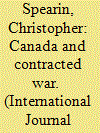

|
|
|
|
|
| Summary/Abstract |
It is important to recognize the multifaceted, and sometimes necessary, role military and security contracting played in supporting the Canadian Armed Forces (CAF) in Afghanistan. It is also important to assess the degree to which this expeditionary experience might shape later Canadian engagement with the private sector. To do so, the paper first identifies the four key areas of CAF military and security contracting pertaining to the mission in Afghanistan: logistics and support personnel, equipment, training, and defensive security. Regarding this last form of contracting, the paper then focuses on Canadian engagement in the development of the Montreux Document and the subsequent creation of the draft National Defence Directive on the Selection and Use of Private Military and Security Contractors on Deployed Operations. Unlike other endeavours, this activism explicitly recognized Canadian reliance on contractors and the need to manage the risk associated with contracting. The paper’s final section suggests the manner in which the directive will shape future contracting decisions, especially given the growing connections between contracting for logistics, training, and defensive security.
|
|
|
|
|
|
|
|
|
|
|
|
|
|
|
|
| 3 |
ID:
136440
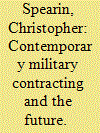

|
|
|
|
|
| Summary/Abstract |
Since the start of the twenty-first century, military contractors such as Blackwater (now named Academi), Kellogg, Brown & Root, and SNC Lavalin have become household names in many countries. The reasons for their prominence vary from case to case. One is notoriety. Particular firms hold contracts valued in the millions if not billions of dollars, and the conduct of some firms has not been beyond reproach in terms of military effectiveness or their observance of human rights. A second reason is reliance. Contractors are needed to keep state military personnel fed and supplied, to maintain their machines, and in some cases even to protect them. Developed world states especially require them for warring, training, and simply operating given the limited numbers of available national military personnel, the increasing sophistication of military technologies, and the political ramifications of applying state forces overseas. In many states, contractors have therefore become part of the total national force. Yet another reason pertains to dedication and sacrifice. Many firms suffered significant levels of casualties during the long-term interventions in Iraq and Afghanistan. Thousands of contracted personnel have provided continuity over the long haul in often austere and intemperate conditions. All of this points to the considerable depth and scope of contractor involvement, arguably unprecedented in recent decades if not centuries. It also stands at odds with traditional conceptions of expensive state security sectors and their capabilities and responsibilities to manage and apply violence.
|
|
|
|
|
|
|
|
|
|
|
|
|
|
|
|
| 4 |
ID:
136448


|
|
|
|
|
| Summary/Abstract |
At a time of increasing attention to the issue of wartime sexual violence, the 2012 Human Security Report (HSR 2012) sought to expose perceived biases in the mainstream narrative. HSR 2012 raised questions about the prevalence of wartime sexual violence, whether this form of violence was increasing or decreasing, the identity of perpetrators and victims, the state of evidence-based research and its challenges, and the policy implications of such analyses. While some of HSR 2012’s findings have been widely accepted, many of the report’s inferences are problematic. This paper uses HSR 2012 as a primary source to ask why narratives about sexual violence matter; why closely examining the report’s narrative, in particular, is important; and how we can be more reflective about what we can and do know about wartime sexual violence, given the opportunities and limitations of conducting research in this field.
|
|
|
|
|
|
|
|
|
|
|
|
|
|
|
|
| 5 |
ID:
136449
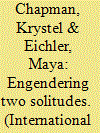

|
|
|
|
|
| Summary/Abstract |
This article brings gender into the two-solitudes debate in Canadian foreign and defence policy by analyzing English- and French-Canadian newspaper coverage of women in combat in Afghanistan. We argue that there are no “two solitudes”—no national divisions are apparent between Quebec and the rest of Canada (ROC) when it comes to media representations of women in combat. Our findings confirm what other scholars have recently argued, which is that differences between the two solitudes on issues of defence policy may be less significant than often stated. The narrative of female combat soldiers presented in the media helps construct a pan-Canadian identity around the idea of Canada’s progressiveness on military gender integration. We also found that the extent to which the death of a female combat soldier received media attention was largely based on her origin from Quebec or the ROC. These differences lead us to conclude that a selective heroization of soldiers on the basis of their origins affects Canadian media coverage of the war.
|
|
|
|
|
|
|
|
|
|
|
|
|
|
|
|
| 6 |
ID:
136444


|
|
|
|
|
| Summary/Abstract |
With the drawdown of US troops from both Iraq and Afghanistan, questions abound regarding the role of private military and security contractors (PMSCs) in American security policy moving forward. This article explores evolving US considerations for the use of various types of PMSCs currently and in the future. In doing so, it argues that the United States will continue to use PMSCs for the foreseeable future, although to a lesser extent than in the previous decade, and for different types of services in different theatres than was witnessed in Iraq and Afghanistan. In particular, it is likely that the US will use PMSCs specializing in security or training/consulting functions in place of US troops for external security support missions. The effects of this shift may be moderated by the private military industry’s increasing adherence to international regulatory standards, although it is likely that such regulations will have the greatest impact on those firms providing security services.
|
|
|
|
|
|
|
|
|
|
|
|
|
|
|
|
| 7 |
ID:
136450


|
|
|
|
|
| Summary/Abstract |
This article explores historical and present-day exclusionary impulses within the human rights movement. It juxtaposes the widely celebrated expansion of universal human rights in the second half of the twentieth century with ideological and institutional counter-movements that have sought to restrict the scope of human rights. Using the exclusionary experience suffered by LGBT people as sexual minorities, the paper argues that we must pay attention to the exclusionary impulses that continually threaten to undermine the full realization of the Universal Declaration of Human Rights’ vision of human rights protection for all, and not just for some.
|
|
|
|
|
|
|
|
|
|
|
|
|
|
|
|
| 8 |
ID:
136446


|
|
|
|
|
| Summary/Abstract |
Over the past few years, Sweden has markedly shifted its position on private military and security companies (PMSCs), from widespread reluctance and general suspicion to increasing acceptance and normalization, along with a gradual institutionalization of the use of PMSCs by Swedish state agencies. On the one hand, this development is part of the broader trend of security commercialization in Europe and globally. On the other hand, it is both shaped by, and shapes, changes within Sweden, where the past years have seen important shifts in foreign and security policies, as well as a substantial transformation of the Swedish Armed Forces, with the ongoing transition from a conscript system to an all-volunteer force (AVF) being the most visible. Drawing on interviews with state officials, records from parliamentary debates, and official government documents, this article analyzes the shift from reluctance to acceptance and identifies and discusses possible future implications of this increased reliance on PMSCs in the context of Swedish military and security transformation, particularly in relation to issues of security governance and civil–military relations and cooperation.
|
|
|
|
|
|
|
|
|
|
|
|
|
|
|
|
| 9 |
ID:
136442
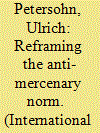

|
|
|
|
|
| Summary/Abstract |
Since the nineteenth century, the anti-mercenary norm has prohibited violent market actors from participating in combat. Today, however, private military and security companies (PMSCs) are widely perceived as legitimate. How did they achieve that legitimacy? This article argues that PMSCs initially resembled mercenaries. Previously, mercenaries were defined as fighters participating in combat for pay, be it offensive or defensive. PMSC advocates aimed to alter the combat component of the anti-mercenary norm. By arguing that PMSCs’ use of force was not combat, but rather individual self-defence, they created an alternative interpretation that established the practice as appropriate. As critical actors like the US, the United Kingdom, and the United Nations adopted their interpretation, the regulatory scope of the norm changed. In short, PMSCs are perceived to be legitimate because they are no longer implicated in the anti-mercenary norm.
|
|
|
|
|
|
|
|
|
|
|
|
|
|
|
|
| 10 |
ID:
136443
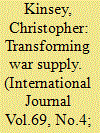

|
|
|
|
|
| Summary/Abstract |
Since the end of the Cold War, policymakers and academics alike have examined in great detail every aspect of military operations apart from military contracting. This article surveys key issues that confront United Kingdom (UK) policymakers. It engages with and updates the secondary sources to explain the evolution, role, and implications of military outsourcing for UK overseas operations in the twenty-first century. It explores the politics, rationale, and consequences of outsourcing technical and support services to expeditionary operations. This article provides a framework for a discussion that is becoming increasingly urgent given the UK military's increasing dependence on military contractors to generate fighting and support capabilities on operations. It proceeds in two steps. First, it traces the evolution of military contracting, identifying the different political and economic drivers behind the decision to engage technical and support contractors on operations. Second, it discusses the future implications for the UK military of this decision
|
|
|
|
|
|
|
|
|
|
|
|
|
|
|
|
| 11 |
ID:
136441


|
|
|
|
|
| Summary/Abstract |
In August 2014, as Islamic State jihadists rampaged through Iraq and engaged in genocidal violence against non-Sunni Muslims, they kidnapped over 3000 Yazidi women and girls. A few months earlier, in May, Boko Haram extremists abducted over 200 schoolgirls in northern Nigeria, consistent with their larger and more systematic abduction campaign mirroring the tactics used by Uganda’s Lord’s Resistance Army. In both Iraq and Nigeria, abducted women and girls are believed to have been taken as wives, sex slaves, and/or servants for their captors. Part of a larger, global trend, these most recent episodes suggest an endemic quality to violence against women in zones of conflict and/or state weakness. From Bosnia to Rwanda, from Syria to Congo, and Iraq to Afghanistan, women and girls have become targets of indescribable brutality in the post-Cold War era, including killings, sexual violence, torture, and forced captivity. However, concurrent with these troubling trends of victimization, the last several decades have also seen important gains for women in the sphere of international security. Women have become more prominent in leadership roles at the community, state, and international levels, including in non-traditional spheres such as foreign policy and defence, and in places as diverse as Albania, Bangladesh, and Chile. This “ascent of women,” to borrow Sally Armstrong’s phrase, has also been evident in policy innovations, including UN resolutions on war rape and sexual violence and on women, peace, and security (WPS), reaffirming the important role of women in international security. The rise in prominence of the gender perspective has also challenged alliances like the North Atlantic Treaty Organization to rethink how they engage in military interventions. Although its actions are still modest in scope, the alliance has INVESTED in WPS initiatives and pushed its member states to submit progress reports to track implementation.
|
|
|
|
|
|
|
|
|
|
|
|
|
|
|
|
|
|
|
|
|